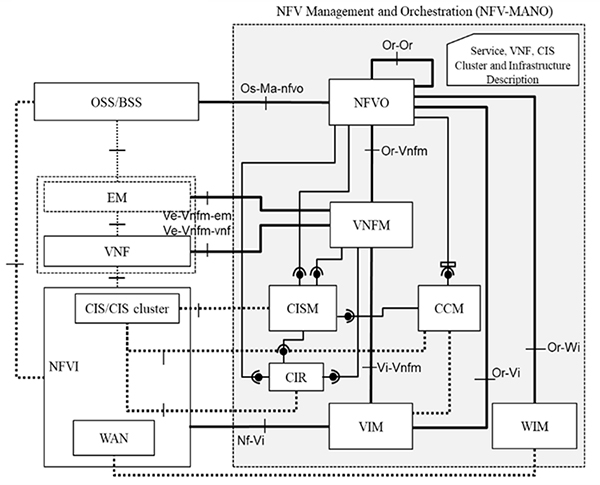Sophia Antipolis, 5 September 2024
The ETSI Industry Specification Group for Network Functions Virtualization (ISG NFV) has just published its specifications of Release 5 first drop as version 5.1.1.
In this version, many study reports to enhance NFV framework have been completed, such as support for virtualized RAN (ETSI GR NFV-IFA 046), multi-tenancy in NFV (ETSI GR NFV EVE 018), and Green NFV (ETSI GR NFV-EVE 021).
These features are expected to extend the ETSI NFV framework with additional capabilities and ETSI NFV specifications will be enhanced accordingly in subsequent versions in Release 5.
Enhancements in Release 5 enable several new capabilities and features in NFV and extend Release 4 features, for example enhancements to support NFV for vRAN, extending the possible VNF configuration options, study the applicability of the SBA design in NFV-MANO, gap analysis regarding the relationship with open source activities, like also enhancements in the NFV framework to support Physical Infrastructure Management (PIM) (ETSI GS NFV‑IFA 053).
PIM and Container Infrastructure Service (CIS) Cluster Management (CCM) can support the management of CIS clusters which serve as the underlay of both cloud-native environments and virtualized resource environments. In addition, in Release 5 additional topics have been investigated to further support both virtualized and containerized deployments (like e.g., 5GC), NFV connectivity, NFV for 5G, VNF generic OAM and PaaS Services, and certificate management.
Stage 3 specifications have also been enhanced to support Flexible VNF and closed the gap with open source in ETSI GR NFV-IFA 051 such as ONAP, OpenStack Tacker and Kubernetes. In addition, stage 3 started to enhance NFVI capacity management for CIS cluster and VNF Configuration studied from ETSI GR NFV-EVE 022.
Figure 1 depicts the NFV architectural framework in Release 4 which remains valid for Release 5 as well.

Figure 1: NFV architectural framework
New study items in Release 5:
ETSI GR NFV-EVE 018 studies multi-tenancy regarding NFV elements consumed by different tenants, e.g. tenant-dependent LCM, tenant-dependent resource management, traffic separation, management isolation, etc.
ETSI GR NFV-EVE 020 studies the integration of Dyncast that dispatches data flows according to network status and computing resources in the NFV architectural framework.
ETSI GR NFV-EVE 021 studies power consumption and energy efficiency, including energy consumption in NFV-based network deployments, energy efficiency management, VNF/NFV‑MANO/NFVI driven energy efficiency, energy related metrics and KPIs.
ETSI GR NFV-EVE 022 studies the use of the VNF configuration options enabled by the NFV architectural framework for day-0 and day-1 configuration of VNF software and virtualize resource.
ETSI GR NFV-IFA 039 studies the application of a Service-Based Architecture (SBA) design style to the NFV-MANO architectural framework from interface design, new functionality and documentation guideline perspective.
ETSI GR NFV-IFA 043 studies enhanced container networking, including telecom specific use cases, OS container multiple network support and network policies for container networking.
ETSI GR NFV-IFA 046 studies the support of virtualized RAN (vRAN) use cases from architectural, operational and management, and capability perspective.
ETSI GR NFV-IFA 051 studies the gap analysis on VNF management between ETSI NFV specifications and the related open source projects that are ONAP ASD, OpenStack Tacker and Kubernetes.
About ETSI
ETSI provides members with an open and inclusive environment to support the timely development, ratification and testing of globally applicable standards for ICT‑enabled systems, applications and services across all sectors of industry and society. We are a not-for-profit body with more than 900 member organizations worldwide, drawn from 64 countries and five continents. Members comprise a diversified pool of large and small private companies, research entities, academia, government and public organizations. ETSI is one of only three bodies officially recognized by the EU as a European Standards Organization (ESO).
For more information please visit us at https://www.etsi.org/
Contact
Email: Press@etsi.org
